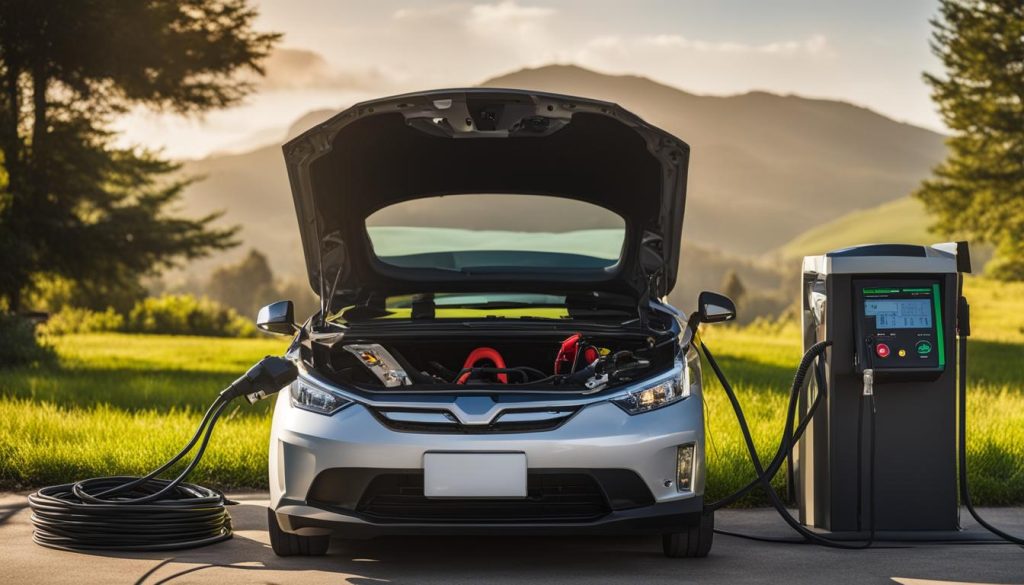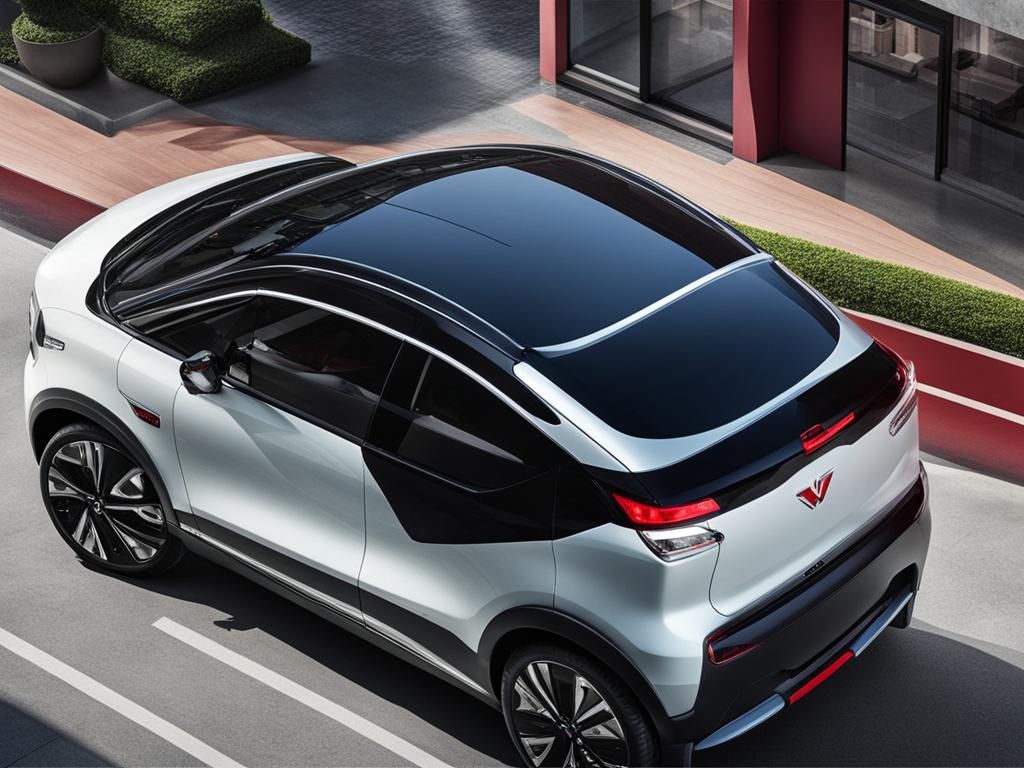What EV battery made of?
Table of Contents
ToggleElectric vehicles (EVs) are becoming increasingly popular due to their environmental benefits and cost-effectiveness. These vehicles are powered by batteries that store electrical energy, which is then used to power the motor. The battery technology used in EVs is constantly evolving, with advances in materials science and engineering driving the development of more efficient and sustainable battery systems.
The most common type of battery used in EVs is the lithium-ion battery. These batteries are lightweight, have a high energy density, and are rechargeable. Lithium-ion batteries are essential for enabling sustainable transportation and renewable energy storage, as they can be recharged and used over and over again. However, there are other materials and technologies being researched for use in future EV batteries.
The battery management system (BMS) plays a key role in optimizing the performance and lifespan of EV batteries. It regulates the charging and discharging of the battery and monitors its health to prevent damage. The BMS ensures that the battery remains within safe operating parameters, thereby prolonging its lifespan and improving its efficiency.
Key Takeaways:
- EV batteries are an essential component of electric vehicles, storing electrical energy to power the motor.
- Lithium-ion batteries are the most common technology used in EVs due to their high energy density and rechargeability.
- Battery management systems optimize battery performance and lifespan by regulating charging and discharging and monitoring battery health.
- Sustainable battery technology plays a crucial role in enabling renewable energy storage and sustainable transportation.
- The development of more efficient and sustainable battery systems is constantly evolving.
The Composition of EV Batteries
Electric vehicle (EV) batteries have become a vital component of modern transportation and renewable energy storage. Lithium-ion battery technology is the most prevalent technology used in the construction of EV batteries due to its high energy density and efficiency.
The basic construction of a lithium-ion battery consists of an anode, a cathode, a separator, and an electrolyte. The anode is typically made of graphite, while the cathode is made of a compound containing lithium such as lithium cobalt oxide, lithium manganese oxide, or lithium nickel cobalt aluminum oxide.
The electrolyte is a solution that allows the flow of ions between the anode and cathode, while the separator keeps the anode and cathode from touching and causing a short circuit. When the battery is charged, lithium ions from the cathode move through the electrolyte and are stored at the anode. When the battery is discharged, the lithium ions move back to the cathode, generating electrical energy in the process.
Advancements in battery technology have led to increased efficiency and improved performance in electric vehicles, contributing to the growth of sustainable battery technology and renewable energy storage systems.
Battery Lifespan and Charging
Electric vehicle batteries are crucial components that power electric vehicles and store renewable energy. The lifespan of EV batteries can vary depending on a range of factors, including the battery technology, frequency of use, and environmental conditions.
To ensure optimal battery lifespan, it is essential to observe proper battery management practices, including regular maintenance and optimal charging habits. Battery charging habits can have a significant impact on the battery lifespan, and overcharging or discharging below recommended levels can damage the battery.
The role of a battery management system is crucial in regulating the charging and discharging processes to ensure optimal battery lifespan. These systems monitor the battery health, regulate the voltage, and temperature to prevent overcharging or undercharging that could damage the battery.
Battery Efficiency and Performance
One of the main factors that determine the performance of an electric vehicle is the efficiency and performance of its battery. As the demand for sustainable transportation and renewable energy storage solutions grows, advancements in battery technology have played a crucial role in achieving these objectives.
Battery Efficiency
The efficiency of an EV battery refers to the amount of energy that is stored and used to power the vehicle. The higher the efficiency of the battery, the more energy it can store and the longer the vehicle can travel on a single charge. Advances in lithium-ion battery technology have led to increased efficiency in EV batteries, resulting in vehicles that can travel farther on a single charge than ever before.
In addition to extending the range of EVs, battery efficiency also plays a critical role in reducing carbon emissions and promoting sustainable transportation. By improving the efficiency of batteries, companies can reduce the size and weight of the battery, making EVs more accessible and affordable for consumers.
Battery Performance
Battery performance refers to the overall effectiveness of the battery in powering the vehicle. A high-performance battery will deliver a consistent level of power, enabling the vehicle to accelerate smoothly and maintain a steady speed. Improvements in battery technology have enabled EVs to perform at levels that are comparable to traditional gasoline-powered vehicles.
Factors that impact battery performance include temperature, charging rates, and the condition of the battery. To optimize battery performance, EV manufacturers incorporate a battery management system into the vehicle. This system monitors the battery’s health, regulates charging and discharging processes, and ensures that the battery operates at peak efficiency.
Renewable Energy Storage
Battery efficiency and performance play a crucial role in enabling renewable energy storage. EV batteries can store energy generated from renewable sources such as solar and wind power, making it possible to use this energy to power homes and businesses. By using EV batteries as a source of renewable energy storage, we can reduce our reliance on non-renewable energy sources and promote a more sustainable future.
Overall, advancements in battery technology have revolutionized the electric vehicle industry and played a vital role in promoting sustainable transportation and renewable energy storage. As battery technology continues to evolve, the future looks brighter than ever for the adoption of clean energy solutions.
Battery Range and Energy Storage
The range of an electric vehicle is a crucial aspect of its performance and practicality. In general terms, the range is often defined as the distance an EV can travel on a single charge. The battery technology used in an EV largely determines its range.
Lithium-ion batteries are the most commonly used battery technology in electric vehicles due to its high-energy density and efficiency. The battery range of an EV depends on the type and number of cells, the battery pack’s size and weight, and the vehicle’s energy consumption.
Battery technology is advancing rapidly, and new technologies are emerging that promise to improve the range and energy storage capabilities of electric vehicles. Solid-state batteries are a promising new type of battery that uses solid electrolytes rather than liquid electrolytes, as in conventional lithium-ion batteries. Compared to liquid electrolytes, solid-state batteries offer higher energy density, faster charging rates, and longer lifespan.
Energy Storage for Sustainable Transportation
The transition towards clean and sustainable transportation is a critical step in reducing greenhouse gas emissions and addressing climate change. Electric vehicles powered by renewable energy sources such as solar and wind power can help achieve this goal.
Battery technology plays a pivotal role in enabling sustainable transportation by storing renewable energy for use in electric vehicles. An efficient energy storage system is essential for achieving high-capacity and long-range energy storage in electric vehicles.
The future of electric vehicle batteries is dependent on advancements in battery technology that enable higher energy density, longer battery life, faster charging, and improved safety. These developments will drive the growth of sustainable energy storage and support the widespread adoption of EVs.
The Future of EV Batteries
The growing demand for electric vehicles (EVs) has led to significant advancements in battery technology, paving the way for a sustainable and clean energy future. The lithium-ion battery is currently the most prevalent battery for electric cars, but there are other types of rechargeable batteries for EVs in development.
You can learn more about How much does the EV battery cost?
Lithium-Ion Battery for Electric Vehicles
The lithium-ion battery has revolutionized the electric vehicle market with its higher energy density and longer lifespan compared to previous battery technologies. The use of lithium-ion batteries has also facilitated sustainable energy storage and the growth of renewable energy systems.
Solid-State Batteries for Electric Vehicles
Solid-state batteries are one of the emerging technologies that hold the potential to transform the electric vehicle market. These batteries have the advantage of higher energy density and safety, being more fire-resistant than the current lithium-ion batteries. Solid-state batteries employ a solid electrolyte instead of a liquid one, enhancing stability, and reducing leakage and degradation.
However, manufacturing solid-state batteries is challenging, and they are currently more expensive than lithium-ion batteries. Research is ongoing to enhance their production and lower their costs, making them more accessible and affordable for consumers.
The Significance of Sustainable Battery Technology
The future of electric vehicle batteries lies in sustainable battery technology. This type of technology focuses on developing batteries that are environmentally friendly, non-toxic, and recyclable. These batteries have a reduced carbon footprint and can contribute to a more sustainable energy storage system.
The move towards sustainable battery technology represents a shift from the traditional focus on conventional battery production, highlighting the importance of mitigating environmental impacts and promoting sustainable practices in the battery industry.
The Future of Electric Vehicle Batteries
The future of EV batteries is promising, with ongoing research and development leading to the emergence of new and improved technologies. As advancements are made, batteries will become more efficient, longer-lasting, and less expensive.
In addition, the future of EV batteries extends beyond electric cars. Batteries will play a critical role in powering other modes of transportation, such as electric buses and trucks. They will also contribute to the growth of renewable energy storage systems, reducing carbon emissions and enabling a more sustainable and clean energy future.
Battery Recycling and Recharge
The importance of proper battery recycling and recharge cannot be understated in the context of sustainable energy storage and the development of electric vehicles. As the number of EVs on the roads continues to rise, effective management of battery end-of-life will become increasingly crucial in reducing the associated waste and environmental impacts.
Recycling of EV batteries has the potential to produce valuable materials for reuse in new batteries, promoting the circular economy and reducing the reliance on new materials. The must be done in a controlled and safe manner to prevent environmental contamination and damage. The rechargeability of EV batteries also needs to be considered in the context of renewable energy storage. Efficient and timely recharge of batteries can play a crucial role in promoting sustainable energy storage while reducing reliance on traditional energy sources.
These issues highlight the significant role that battery technology plays in our energy system and the importance of implementing sustainable practices to manage the end-of-life of EV batteries. As technology continues to evolve, it is imperative that recycling processes and recharge systems keep up, contributing to a cleaner and more sustainable future.
The Role of Battery Management Systems
Battery management systems (BMS) play a crucial role in ensuring the optimal performance and longevity of EV batteries. BMS monitors the battery health, regulates the charging and discharging processes, and prevents overheating or overcharging of batteries.
One of the key functions of BMS is to maintain a balance between the cells in the battery. As EV batteries consist of multiple cells, a discrepancy in the charge levels of any individual cell can result in reduced overall battery performance and lifespan. BMS monitors the charge levels of each cell and ensures their equal distribution, thus preventing overcharging or undercharging of individual cells.
BMS also regulates the charging and discharging processes of the battery. EV batteries have a limited lifespan and charging or discharging processes that are too harsh can significantly reduce battery life. BMS ensures that these processes are optimized and kept within safe limits, thus maximizing the lifespan of the battery.
BMS also plays a critical role in optimizing the charging process. It monitors the charging rate, ensures that the battery is charged to the appropriate levels, and prevents overcharging. Efficient charging not only ensures the longevity of the battery but also minimizes energy waste, contributing to sustainable energy storage.
Overall, the function of BMS is crucial in enabling the optimal performance and lifespan of EV batteries. It is an integral component of the battery technology that supports renewable energy storage and sustainable battery technology for the future of clean and efficient transportation.
The Importance of Energy Efficiency
Energy efficiency is a crucial aspect of sustainable and clean energy solutions, and EV batteries play a significant role in achieving it. As the world shifts towards renewable energy sources and seeks to reduce carbon emissions, ensuring energy efficiency becomes increasingly important.
Electric vehicle batteries contribute to energy efficiency by storing energy that would otherwise be wasted and using it to power the vehicle. This stored energy can also be used for renewable energy storage and sustainable energy storage systems, contributing to the overall energy efficiency of the transportation sector.
Advancements in battery technology have led to increased energy efficiency in EV batteries, resulting in longer battery life and improved performance. Additionally, battery management systems play a critical role in optimizing battery efficiency, ensuring that energy is used efficiently and effectively.
The importance of energy efficiency in promoting sustainable transportation and renewable energy storage cannot be overstated. As the world continues to embrace clean energy solutions, EV batteries will remain a key component in achieving energy efficiency and reducing carbon emissions.
Electric Vehicle Charging Infrastructure
The growth of electric vehicles has given rise to the need for an efficient and widespread electric vehicle charging infrastructure. EV owners require access to charging stations to recharge their vehicles, making the availability and accessibility of charging stations a crucial factor in the adoption of sustainable transportation.
There are various types of charging stations, ranging from residential chargers to public charging stations that can provide a quick charge on the go. The development of charging infrastructure not only benefits EV owners but also supports renewable energy storage solutions.
Sustainable transportation is not just about having an electric vehicle but also ensuring that the energy used to power the vehicle is from clean and renewable sources. As EVs become more widespread, the need for renewable energy storage capacity will increase, which can be effectively integrated into an efficient charging infrastructure.
The importance of battery technology is highlighted in the development of an effective EV charging infrastructure. EV batteries play a significant role in enabling sustainable transportation and renewable energy storage. As the demand for EVs continues to grow, battery technology must continue to advance to ensure efficient energy storage and charging capabilities.
The Role of EV Batteries in Powering Electric Vehicles
Electric vehicles rely on batteries for power, making the electric vehicle battery a crucial component of sustainable transportation. The battery stores energy that is then converted into electric power to drive the vehicle’s electric motors.
The efficiency and performance of the battery impact the power output and range of the vehicle, which is why advancements in battery technology are critical to the growth of sustainable and clean energy transportation. Improvements in renewable energy storage and sustainable battery technology have led to longer-range EVs with faster charging times, making them more practical for daily use.
Electric vehicle batteries also play a key role in integrating renewable energy into the power grid. By storing excess energy generated by renewable sources such as solar and wind, the battery can help balance the energy supply and demand and improve the overall stability of the grid.
With the ongoing advancements in battery technology, the potential for EV batteries to revolutionize the way we power our vehicles and homes is immense. From solid-state batteries to new chemistries and materials, the future of electric vehicle batteries looks bright, with the potential to pave the way for a more sustainable and clean energy future.
Conclusion
In conclusion, electric vehicle batteries are an indispensable component in enabling clean and sustainable energy solutions. As the world continues to shift towards renewable energy sources, the significance of EV batteries in energy storage cannot be overstated.
Advancements in battery technology have led to increased efficiency, improved performance, and longer lifespan, contributing to the growth of sustainable battery technology and renewable energy storage.
The future of electric vehicle batteries looks promising, with emerging technologies such as solid-state batteries on the horizon. These innovations have the potential to further improve battery life, efficiency, and range, paving the way for a sustainable and clean energy future.
Efficient electric vehicle charging infrastructure is crucial in supporting the widespread adoption of EVs, highlighting the importance of sustainable transportation. EV batteries play a key role in powering electric vehicles, enabling a shift towards clean energy and reducing carbon emissions.
Finally, it is essential to consider the sustainability of EV batteries throughout their entire lifecycle. Battery recycling is crucial in promoting renewable energy storage and sustainable energy storage systems.
Overall, electric vehicle batteries have revolutionized the automotive industry, providing a clean and sustainable energy source. The future of electric vehicle batteries is bright, and it is essential to continue improving battery technology in pursuit of a sustainable energy future.
FAQ
What are electric vehicle batteries made of?
Electric vehicle batteries are typically made of lithium-ion battery technology, which consists of various materials such as lithium, graphite, cobalt, and nickel. These materials help to store and release energy efficiently, enabling the propulsion of electric vehicles.
How does the composition of EV batteries work?
Electric vehicle batteries, specifically lithium-ion batteries, function by using a chemical reaction between the lithium-based electrolyte and the electrodes made of graphite, cobalt, and nickel. This reaction allows the battery to store and release electrical energy, powering the electric vehicle.
What factors impact the lifespan and charging of EV batteries?
The lifespan of electric vehicle batteries can be influenced by factors such as temperature, charging frequency, depth of discharge, and overall battery management. Proper charging practices, including the use of a battery management system, can optimize the charging process and help prolong the lifespan of EV batteries.
How does battery efficiency and performance affect electric vehicles?
Advancements in battery technology have led to improved efficiency and performance in electric vehicles. More efficient batteries allow for longer driving ranges, faster charging times, and increased overall performance. These advancements contribute to the growth of sustainable battery technology and renewable energy storage.
What is the importance of battery range in electric vehicles?
Battery range is a crucial aspect of electric vehicles as it determines how far an EV can travel on a single charge. Battery technology advancements are constantly striving to increase the range, allowing for longer trips without needing to recharge. Energy storage plays a vital role in enabling sustainable transportation and renewable energy integration.
What does the future hold for EV batteries?
The future of EV batteries looks promising with emerging technologies such as solid-state batteries on the horizon. These advancements have the potential to improve battery life, efficiency, and range, ultimately contributing to a sustainable and clean energy future for electric vehicles.
Why is battery recycling and rechargeability important for EV batteries?
Battery recycling is crucial for the sustainable disposal and reuse of EV batteries. Proper recycling practices help recover valuable materials, reduce waste, and promote renewable energy storage. Additionally, the rechargeability of EV batteries allows for repeated use and optimal utilization of resources.
What is the role of battery management systems in EV batteries?
Battery management systems play a critical role in optimizing the performance and lifespan of EV batteries. These systems monitor battery health, regulate charging and discharging processes, and ensure the overall efficiency of the battery. They contribute to maintaining battery health and extending its lifespan.
Why is energy efficiency important in electric vehicles?
Energy efficiency is vital in electric vehicles as it helps reduce carbon emissions and promotes clean and sustainable transportation. EV batteries play a significant role in achieving energy efficiency by storing and delivering electrical energy in an efficient manner, enabling a greener and more sustainable future.
What is the role of EV batteries in powering electric vehicles?
EV batteries store electrical energy that is converted into power to propel electric vehicles. These batteries act as the primary power source for electric vehicles, allowing them to operate without relying on traditional fossil fuels. The advancements in battery technology have revolutionized the future of sustainable and clean energy transportation.



